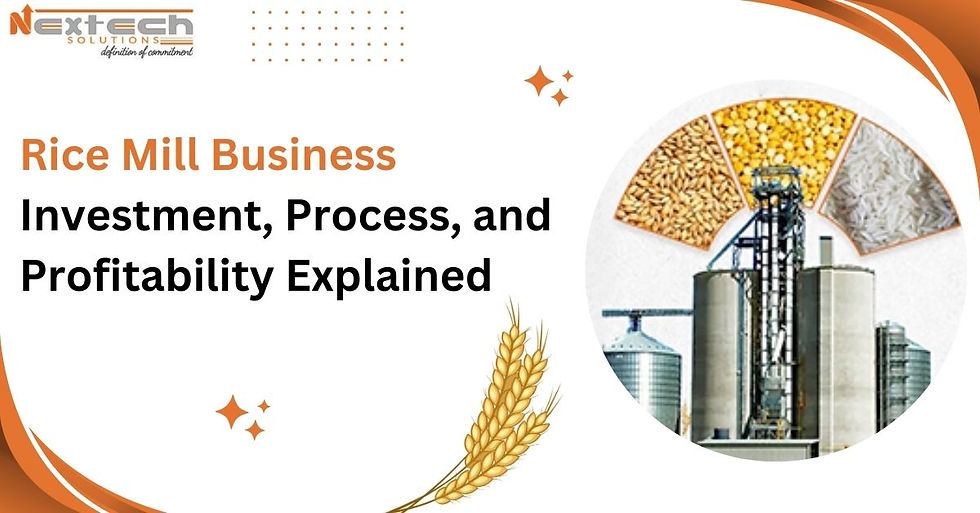Why Modern Grain Milling Solutions Are Key to Global Food Security
- S.P. Singh
- Jul 3, 2025
- 3 min read
In a world where food demand is rapidly increasing, ensuring efficient food processing and distribution is critical. Grain milling solutions play a pivotal role in strengthening food supply chains, reducing waste, and enhancing storage capabilities. As populations grow and climate change threatens agricultural productivity, adopting advanced milling technologies becomes not just an option—but a necessity.
At Nextech Agri Solutions, we understand the transformative power of modern grain milling solutions in securing global food systems. This blog explores how efficient milling impacts food security, reduces losses, and supports sustainable agriculture.

The Role of Grain Milling Solutions in Strengthening Food Supply Chains
Food supply chains rely heavily on efficient processing to deliver quality grains from farms to consumers. Traditional milling methods often lead to inefficiencies, but modern grain milling solutions optimize the entire process.
Key Benefits of Advanced Milling Technology:
✔ Higher Yield & Better Quality – Precision milling ensures maximum extraction of edible grains, reducing broken kernels and impurities.✔ Faster Processing – Automated systems speed up production, meeting rising food demands efficiently.✔ Consistent Output – Uniform grain size and texture improve marketability and consumer satisfaction.
Countries like India, where rice is a staple, benefit significantly from optimized rice mill projects. Upgrading to advanced grain milling solutions can enhance productivity in rice mills in India, ensuring stable food supplies.
Reducing Post-Harvest Losses with Smart Milling Technologies
A major challenge in global food security is post-harvest loss. Poor storage and inefficient milling contribute to nearly 30% of grain wastage. Modern grain milling solutions integrate smart technologies to minimize these losses.
How Advanced Milling Cuts Down Waste:
🔹 Improved Storage Compatibility – Properly milled grains have longer shelf life, reducing spoilage.🔹 Reduced Broken Grains – Precision milling minimizes breakage, maximizing usable output.🔹 Byproduct Utilization – Husk and bran from milling can be repurposed for animal feed or biofuel, promoting zero-waste practices.
For instance, in rice mills in India, adopting high-tech grain milling solutions has significantly reduced post-harvest losses, ensuring more food reaches consumers.
Enhancing Storage Efficiency Through Optimized Milling
Storage is a critical factor in food security. Poorly milled grains are more susceptible to pests, mold, and moisture damage. Modern grain milling solutions ensure grains are processed to optimal standards, enhancing storage durability.
Impact of Efficient Milling on Storage:
✅ Lower Moisture Content – Properly milled grains resist fungal growth.✅ Better Aeration – Uniform grain size allows proper airflow in storage silos.✅ Reduced Infestation Risk – Clean, well-processed grains attract fewer pests.
By investing in advanced rice mill projects, farmers and processors can drastically improve grain longevity, reducing dependency on chemical preservatives.
Supporting Sustainability & Social Responsibility
The shift toward modern grain milling solutions isn’t just about efficiency—it’s about sustainability. As global food systems face pressure from climate change and population growth, responsible milling practices become essential.
Eco-Friendly Advantages of Modern Milling:
🌱 Energy Efficiency – New-age mills consume less power, lowering carbon footprints.🌱 Water Conservation – Many modern systems use minimal water, crucial in drought-prone regions.🌱 Supporting Small Farmers – Affordable milling tech empowers local rice mills in India and other developing nations.
Companies like Nextech Agri Solutions are at the forefront of providing sustainable grain milling solutions, ensuring food security while protecting the environment.
The Future of Grain Milling: Smart & Scalable Solutions
The future of food security lies in scalable and intelligent milling systems. Innovations like AI-powered sorting, IoT-enabled monitoring, and blockchain-based traceability are revolutionizing grain milling solutions.
Emerging Trends in Grain Processing:
🚀 AI & Automation – Predictive maintenance and real-time quality checks enhance efficiency.🚀 Modular Rice Mill Projects – Compact, customizable mills cater to small and large-scale needs.🚀 Sustainable Practices – Solar-powered mills and waste-recycling systems are gaining traction.
With these advancements, rice mills in India and worldwide can achieve higher productivity while minimizing environmental impact.
Conclusion: Milling for a Food-Secure Future
Modern grain milling solutions are no longer a luxury—they are a necessity for global food security. By improving processing efficiency, reducing waste, and enhancing storage, these technologies ensure that more food reaches those who need it most.
Whether it’s upgrading rice mill projects or adopting cutting-edge milling systems, the path to sustainability starts with innovation. Nextech Agri Solutions is committed to delivering advanced grain milling solutions that empower farmers, processors, and consumers alike.
The time to act is now—because a food-secure world begins with smarter milling.
By integrating efficient grain milling solutions, we can build resilient food systems that withstand future challenges. If you're looking to optimize your milling processes, explore how Nextech Agri Solutions can help you achieve sustainability and productivity.

Comments